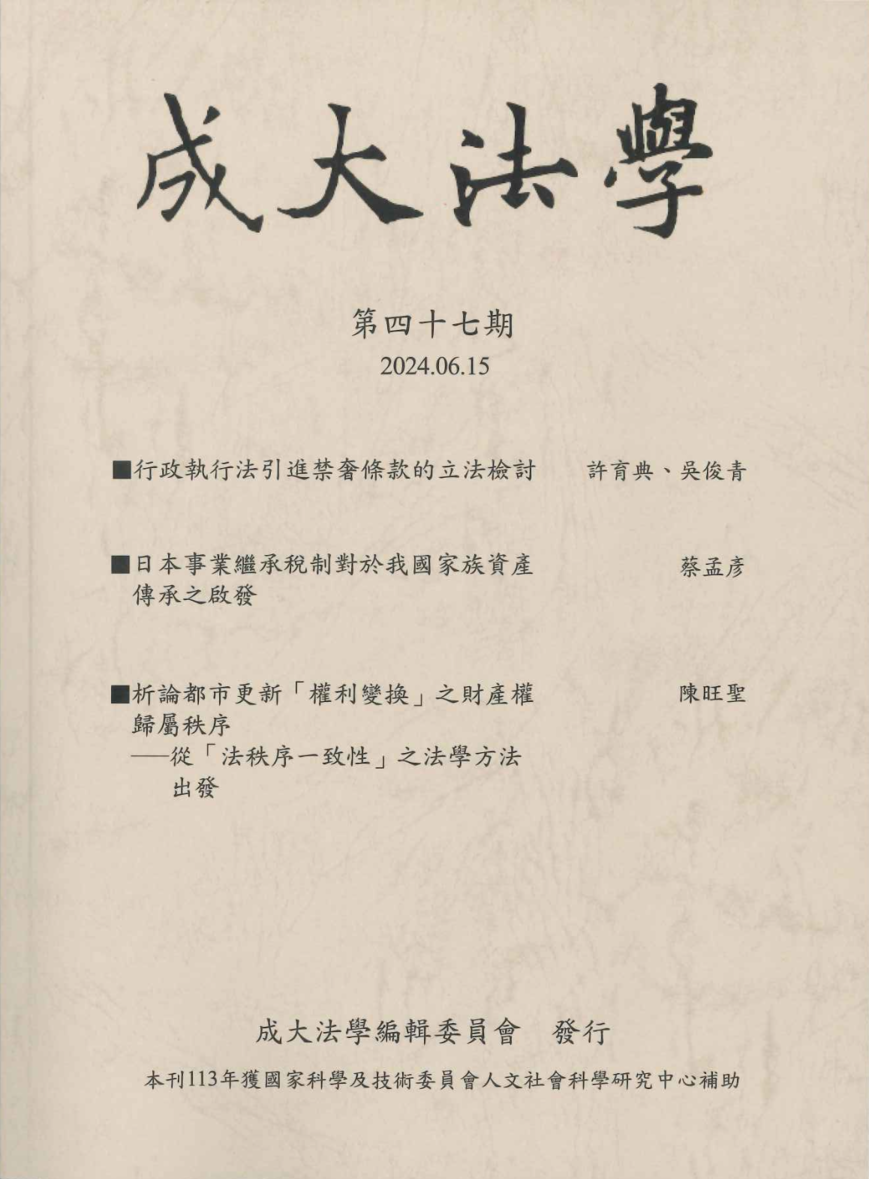The Archive
The Archive
Page: 109﹣206
析論都市更新「權利變換」之財產權歸屬秩序——從「法秩序一致性」之法學方法出發
Analysis of the Attribution Order in Property Rights of “Rights Transfer” in Urban Renewal: A Study Based on the Method of Jurisprudence of “Concordance of the Legal Order”
Author(Chinese)
陳旺聖
Author(English)
Wang-Sheng Chen
Keyword(Chinese)
都市更新、法秩序一致性、法學方法、權利變換、財產權歸屬秩序、權利變動
Keyword(English)
Urban Renewal, Concordance of the Legal Order, Method of Jurisprudence, Rights Transfer, Attribution Order in Property Rights, Rights Alteration
Chinese abstract
都市更新法制之探索,以「權利變換」為常見之都市更新實施方式,涉及權利人之財產權變動之歸屬秩序。為能形成都市更新權利變換合目的性之財產權歸屬秩序,本文導入「法秩序一致性」為論證思考之法學方法。
本文就「權利變換」於都市更新法制之規範構造之前理解,予以而論;並加以觀察「權利變換」財產權歸屬秩序之應然與實然所生之問題,尤以都市更新條例與民法對於權利變動之規制仍尚未有一致,就所有權變動、用益物權變動、擔保物權變動之價值秩序中,更新前後之權利歸屬應如何形成適法性、適當性、妥適性之判斷思考。本文亦進一步分析都市更新條例第56條「視為原有」之性質為何,依「權利變換」之立體交換,採取所有權轉換說,無涉原始取得或繼受取得。尚且,依土地、建築物所有權之性質而分別釐清分配結果確定之日之疑義,方合乎「法秩序一致性」之詮釋──分配土地所有權視為原有之時點認定,應以「囑託登記完成之日」為分配結果確定之日,而分配建築物所有權視為原有之時點認定,應係以「使用執照核發之日」為分配結果確定之日。
本文試圖從方法論之視角省視都市更新「權利變換」私權變動,分別就日本都市再開發法關於「權利變換」物權變動之啟發、都市更新條例就「權利變換」不符「法秩序一致性」之處、都市更新「權利變換」所涉財產權歸屬秩序之建議,藉此提出都市更新「權利變換」財產權歸屬關係之合目的性詮釋,期為我國都市更新法制對於「權利變換」財產權之歸屬秩序,提供較具融貫性(整全性)之財產法概念。
本文就「權利變換」於都市更新法制之規範構造之前理解,予以而論;並加以觀察「權利變換」財產權歸屬秩序之應然與實然所生之問題,尤以都市更新條例與民法對於權利變動之規制仍尚未有一致,就所有權變動、用益物權變動、擔保物權變動之價值秩序中,更新前後之權利歸屬應如何形成適法性、適當性、妥適性之判斷思考。本文亦進一步分析都市更新條例第56條「視為原有」之性質為何,依「權利變換」之立體交換,採取所有權轉換說,無涉原始取得或繼受取得。尚且,依土地、建築物所有權之性質而分別釐清分配結果確定之日之疑義,方合乎「法秩序一致性」之詮釋──分配土地所有權視為原有之時點認定,應以「囑託登記完成之日」為分配結果確定之日,而分配建築物所有權視為原有之時點認定,應係以「使用執照核發之日」為分配結果確定之日。
本文試圖從方法論之視角省視都市更新「權利變換」私權變動,分別就日本都市再開發法關於「權利變換」物權變動之啟發、都市更新條例就「權利變換」不符「法秩序一致性」之處、都市更新「權利變換」所涉財產權歸屬秩序之建議,藉此提出都市更新「權利變換」財產權歸屬關係之合目的性詮釋,期為我國都市更新法制對於「權利變換」財產權之歸屬秩序,提供較具融貫性(整全性)之財產法概念。
English abstract
Exploration of the urban renewal legal system, which commonly employs “rights transfer” as a method of implementation, involves determining the attribution order of property rights changes among rights holders. To establish a property rights attribution order in urban renewal rights transfer aligned with its purpose, this article introduces “Concordance of the Legal Order” as a legal method for argumentation.
The article delves into the normative structure of rights transfer within the urban renewal legal system before discussing its understanding. It observes issues arising from both normative and actual attribution orders of property rights due to rights transfer. Particularly, discrepancies still exist between the Urban Renewal Act and the Civil Code regarding regulations governing rights alteration. Regarding the value order of ownership alteration, usufructuary right alteration, and real rights for security alteration, the article examines how pre-renewal and post-renewal rights attribution should be judged for legality, appropriateness, and adequacy. Furthermore, the article analyzes the nature of Article 56 of the Urban Renewal Act as “considered the original owners”. Following the three-dimensional exchange of rights transfer, it adopts the theory of ownership conversion without reference to original acquisition or succession. Clarification is provided regarding the determination of the date of distribution results, with the completion date of “entrusted registration” identified as the decisive date for allocating land ownership, and the issuance date of “usage permit” as the determinative point for identifying the date of building ownership, distinguishing between the nature of land and building ownership for interpretation consistent with the “Concordance of the Legal Order”.
This article attempts to examine the alteration of private rights in urban renewal rights transfer from a methodological perspective. It draws inspiration from the Urban Redevelopment Act of Japan concerning the alteration of property rights, identifies inconsistencies in the Urban Renewal Act regarding rights alteration that do not align with legal order, and proposes recommendations for the attribution order in property rights involved in urban renewal rights alteration. This is aimed at providing a purposive interpretation of the attribution order in property rights in urban renewal rights alteration, thereby offering a more coherent concept of property law integrity within our country’s urban renewal legal system.
The article delves into the normative structure of rights transfer within the urban renewal legal system before discussing its understanding. It observes issues arising from both normative and actual attribution orders of property rights due to rights transfer. Particularly, discrepancies still exist between the Urban Renewal Act and the Civil Code regarding regulations governing rights alteration. Regarding the value order of ownership alteration, usufructuary right alteration, and real rights for security alteration, the article examines how pre-renewal and post-renewal rights attribution should be judged for legality, appropriateness, and adequacy. Furthermore, the article analyzes the nature of Article 56 of the Urban Renewal Act as “considered the original owners”. Following the three-dimensional exchange of rights transfer, it adopts the theory of ownership conversion without reference to original acquisition or succession. Clarification is provided regarding the determination of the date of distribution results, with the completion date of “entrusted registration” identified as the decisive date for allocating land ownership, and the issuance date of “usage permit” as the determinative point for identifying the date of building ownership, distinguishing between the nature of land and building ownership for interpretation consistent with the “Concordance of the Legal Order”.
This article attempts to examine the alteration of private rights in urban renewal rights transfer from a methodological perspective. It draws inspiration from the Urban Redevelopment Act of Japan concerning the alteration of property rights, identifies inconsistencies in the Urban Renewal Act regarding rights alteration that do not align with legal order, and proposes recommendations for the attribution order in property rights involved in urban renewal rights alteration. This is aimed at providing a purposive interpretation of the attribution order in property rights in urban renewal rights alteration, thereby offering a more coherent concept of property law integrity within our country’s urban renewal legal system.
線上閱覽
Fulltext Downloadget_app
2.Withdrawn




